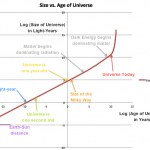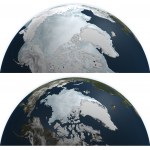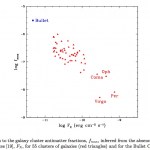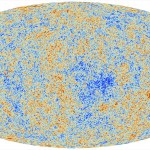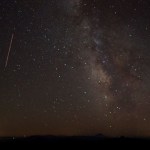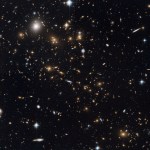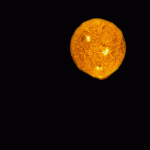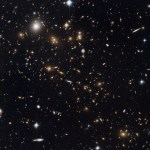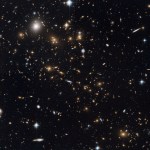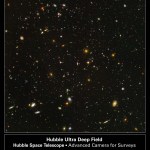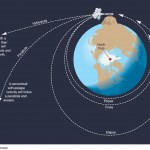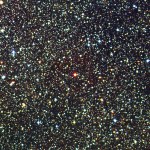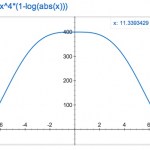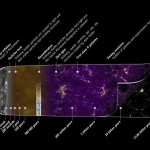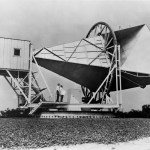Big Bang
"For the wise man looks into space and he knows there is no limited dimensions." -Lao Tzu
You know the deal: it's the end of the week, so it's time for another Ask Ethan! You've continued to send in your questions-and-suggestions, much to my delight, and I'm pleased to tell you that this week's question comes from Peter Tibbles. Peter asks about obtaining information from beyond where Einstein's theory of relativity allows us to see:
Because of the expansion of the universe there is an event horizon beyond which we can know nothing. There’s been one instance of intelligent life…
"The world owes you nothing. It was here first." -Mark Twain
When you think about where all of this came from -- back to the beginning of the Universe -- there's a good chance it makes you a little uncomfortable. For this week's Ask Ethan, our one remaining column here on ScienceBlogs, our reader vvv asks a question that quite possibly many of you have wondered:
Why didn't the universe collapse into a black hole right "at the moment of the big bang?"
And quite honestly, I've wondered a fair bit about this myself. Here's why.
Image credit: Kerry-Ann Lecky Hepburn (Weather and Sky Photography…
"Some say the world will end in fire,
Some say in ice.
From what I've tasted of desire
I hold with those who favor fire.
But if it had to perish twice,
I think I know enough of hate
To say that for destruction ice
Is also great
And would suffice." -Robert Frost
Depending on where you are in the world right now, you might really be feeling the effects of the emerging winter, as cold snaps, freezes and snowstorms take hold across the northern hemisphere.
Image credit: NASA's Scientific Visualization Studio, Goddard Space Flight Center.
But we can all be pretty sure that this is temporary,…
“If you see an antimatter version of yourself running towards you, think twice before embracing.” -J. Richard Gott III
It may not occur to you that it's a special thing that the Earth and everything found on it is made of matter; it seems intuitive that it couldn't be any other way. And yet, the very laws of nature themselves haven't yet told us why or how the Universe is this way! For this week's Ask Ethan (and leave your own questions or suggestions here), our regular reader Michael Fisher wants us to get at the heart of this, asking:
Is it true that in the early universe matter…
"One of the most tragic things I know about human nature is that all of us tend to put off living. We are all dreaming of some magical rose garden over the horizon instead of enjoying the roses that are blooming outside our windows today." -Dale Carnegie
Our new Ask Ethan segment has been really popular, and the questions and suggestions keep pouring in. It's your Universe too, and if there's something you want to know about it, you should ask! (So keep it up!) This week's question is one of the biggest of them all, and it comes courtesy of John L. Ferri, who asks,
I have a difficult time…
"I have an existential map. It has 'You are here' written all over it." -Steven Wright
So just because the Ask Ethan series is becoming way more popular than I can handle -- I've got more than 200 questions that I'm sitting on by now -- doesn't mean you should stop sending your questions! There are some really good ones, and today's comes from Robert Plotner, who asks:
When maps of the CMB are depicted, they are shown as a flattened ovoid. How does this correlate to our view of the sky which is a sphere? For example, a global map of the Earth is either distorted to show it in two dimensions…
Farnsworth: "There is it. The edge of the Universe!"
Fry: "Far out. So there's an infinite number of parallel Universes?"
Farnsworth: "No, just the two."
Fry: "Oh, well, I'm sure that's enough."
Bender: "I'm sick of parallel Bender lording his cowboy hat over me!" -Futurama
Our existence here in this Universe is something that we know is rare, special, beautiful, and full of wonder.
Image credit: Kelly Montgomery.
Some things happen with amazing regularity and predictability: the occurrence of days-and-nights, the tides, the seasons, the motion of the heavenly bodies, and so much more. The…
"Observations indicate that the universe is expanding at an ever increasing rate. It will expand forever, getting emptier and darker." -Stephen Hawking
Today's Ask Ethan comes to us via our question/suggestion box from reader MIUFish, who asks:
I read something recently about some people who were doing work looking at the possibility that the mass of things has been decreasing, as an alternate explanation - or, perhaps, interpretation - to some of the questions regarding the expansion of the universe and so on.
Is there any seriousness to this? Do you know anything about it?
Here's…
“We are not simply in the universe, we are part of it. We are born from it.” -Neil deGrasse Tyson
The story of the Universe is the story of us all; we all share the same cosmic history, coming from a hot, dense state some 13.8 billion years ago known as the Big Bang and emerging after billions of years of cosmic evolution to the Universe we know and love today.
Image credit: ESA and the Planck collaboration.
It's a beautiful story -- and one I've told before -- but it might seem, at least from our perspective, that something is missing from the astrophysicist's version of events. Yes, we…
"These neutrino observations are so exciting and significant that I think we're about to see the birth of an entirely new branch of astronomy: neutrino astronomy." -John Bahcall
You've been around here long enough to know about the Big Bang. The vast majority of galaxies are speeding away from us, but more than that, the farther away they are from us, the faster they appear to be receding.
Image credit: ESA/Hubble, NASA and H. Ebeling.
But it's more than that; when you look at a distant galaxy, because the speed of light is finite, you're actually looking at it in the distant past.…
"By denying scientific principles, one can maintain any paradox." -Galileo Galilei
Day and night. It seems like the simplest, most natural thing about our world, that the Sun illuminates one half of the Earth at a time.
Image credit: Public Domain Image from Desktop Wallpaper HD.
While the Earth spins on its axis, orbiting the Sun, roughly half of our lives are spent bathed in the glorious daylight provided by our parent star. The other half is spent in the dark of night, our world illuminated only by the distant stars and galaxies visible from a great distance, along with a few nearby…
"I see a lot of new faces. But, you know the old saying, 'out with the old, in with the nucleus.'" -The Simpsons
Looking around the Universe today, there's no doubt that there's plenty of hydrogen and helium around; after all, it's the nuclear fusion of hydrogen into helium that powers the vast majority of stars illuminating the entire cosmos!
Image credit: ESA/Hubble, NASA and H. Ebeling.
But here on Earth, hydrogen and helium are only a small part of the world we inhabit. By mass, hydrogen and helium combined make up far less than 1% of the Earth, and even if we restrict ourselves…
"Science cannot tell theology how to construct a doctrine of creation, but you can't construct a doctrine of creation without taking account of the age of the universe and the evolutionary character of cosmic history." -John Polkinghorne
Out there in space, whether we look with our eyes or with a telescope -- a far more powerful version of our eyes -- we find that the Universe is full of stars, galaxies, clusters, and luminous objects everywhere we look.
Image credit: Rogelio Bernal Andreo of http://www.deepskycolors.com/.
But if we look in different wavelengths of light than what our eyes…
"Twinkle, twinkle, quasi-star
Biggest puzzle from afar
How unlike the other ones
Brighter than a billion suns
Twinkle, twinkle, quasi-star
How I wonder what you are." -George Gamow
The Big Bang is one of the greatest, revolutionary ideas in all of modern science, but it's also one of the most successful ideas as far as making predictions that have aligned with our observations of the Universe. Despite all of that, there are a whole bunch of people who'll read this (and more who won't) who aren't sure that the Big Bang is correct. Some people, in fact, don't even understand the definition…
"There could be no fairer destiny for any physical theory than that it should point the way to a more comprehensive theory in which it lives on as a limiting case." -Albert Einstein
Imagine: you've worked hard all your life, through your primary and secondary school education, where you worked hard to get into a good college, through your undergraduate degree, where you found something you were passionate enough about that you wanted to study it even further, and then through graduate school, where you spent half-a-decade or more immersing yourself, non-stop, in an area of research in a field…
"Anyone who has never made a mistake has never tried anything new." -Albert Einstein
Back when Einstein first proposed his theory of General Relativity, his revolutionary picture of the Universe was met with a mix of curiosity, awe, and intense skepticism. It isn't every day that your most cherished of all physical theories -- the theory of Newtonian Gravity that had ruled the cosmos for nearly two-and-a-half centuries -- gets challenged by a newcomer.
Image credit: Brooks/Cole - Thomson publishing, 2005.
And yet, that's exactly what Einstein did when he proposed General Relativity at the…
"All our sweetest hours fly the fastest." -Virgil
If you've been around the block once or twice, you know that the speed of light in a vacuum -- 299,792,458 meters-per-second -- is the absolute maximum speed that any form of energy in the Universe can travel at. In shorthand, this speed is known as c to physicists.
Image credit: user Fx-1988 of deviantART.
But you or I, no matter how hard we try, will never attain that speed. There's a simple reason for this: we have mass. And for an object with mass, you can accelerate it all you want, but it would take an infinite amount…
"Despite its name, the big bang theory is not really a theory of a bang at all. It is really only a theory of the aftermath of a bang." -Alan Guth
So you finally understand it. The Big Bang tells us that the Universe was hotter, denser, and expanding at a faster rate in the past.
Image credit: original source unknown.
The farther back we go, the closer together everything was, the higher in temperature (and shorter in wavelength) all the radiation was, and -- of course -- the younger the Universe was.
Image credit: Ned Wright (possibly Will Kinney, too), via http://ned.ipac.…
"The cosmos is all that is or ever was or ever will be. Our feeblest contemplations of the Cosmos stir us—there is a tingling in the spine, a catch in the voice, a faint sensation, as if a distant memory, or falling from a height. We know we are approaching the greatest of mysteries." -Carl Sagan
One of the greatest things we can do -- when we study and learn the story of the Universe -- is simply to tell that story, as best as modern science allows us to. Earlier this week, I had a chance to do this in front of a small, intimate audience at the Hand-Eye Supply Curiosity Club here in Portland…
"Orbiting Earth in spaceship, I saw how beautiful our planet is. People, let us preserve and increase beauty, not destroy it!" -Yuri Gagarin
Fifty-two years ago today, the first human being left Earth, and we began our journey into outer space. But back in 1961, we didn't really know how far outer space stretched, or where all the matter and energy in the Universe came from.
Image credit: NASA, 1962.
That all changed with the discovery of the Cosmic Microwave Background (by Penzias and Wilson, with the Horn Antenna, above), and subsequent measurements that led us to the Big Bang picture of…

